Stay in the know on all smart updates of your favorite topics.
Cenex Webinar #2 - EV Chargers: How to know where to place them?

Join us for an exclusive webinar featuring three leading European cities sharing their proven strategies for EV charging infrastructure placement. Learn from real-world experiences and discover data-driven approaches that are transforming urban mobility across Europe.
𝗪𝗵𝗮𝘁 𝗬𝗼𝘂'𝗹𝗹 𝗟𝗲𝗮𝗿𝗻
🏙️ 𝗦𝘁𝗿𝗮𝘁𝗲𝗴𝗶𝗰 𝗣𝗹𝗮𝗰𝗲𝗺𝗲𝗻𝘁 𝗔𝗽𝗽𝗿𝗼𝗮𝗰𝗵𝗲𝘀 - Discover how Brighton & Hove, Oslo, and Metropolitan Region of Amsterdam Electric have developed their EV charging strategies
📊 𝗗𝗮𝘁𝗮-𝗗𝗿𝗶𝘃𝗲𝗻 𝗗𝗲𝗰𝗶𝘀𝗶𝗼𝗻 𝗠𝗮𝗸𝗶𝗻𝗴 - Learn about the tools and methodologies these cities use to optimize charging point locations
🚗 𝗦𝗲𝗿𝘃𝗶𝗻𝗴 𝗔𝗹𝗹 𝗥𝗲𝘀𝗶𝗱𝗲𝗻𝘁𝘀 - Understand how to address the needs of residents without private parking spaces
🌍 𝗜𝗻𝘁𝗲𝗿𝗻𝗮𝘁𝗶𝗼𝗻𝗮𝗹 𝗕𝗲𝘀𝘁 𝗣𝗿𝗮𝗰𝘁𝗶𝗰𝗲𝘀 - Gain insights from three different countries and municipal perspectives
💡 𝗟𝗲𝘀𝘀𝗼𝗻𝘀 𝗟𝗲𝗮𝗿𝗻𝗲𝗱 - Avoid common pitfalls and learn from real implementation experiences
𝗙𝗲𝗮𝘁𝘂𝗿𝗲𝗱 𝗦𝗽𝗲𝗮𝗸𝗲𝗿𝘀
Kieran Fitsall - Brighton & Hove Council
Sture Portvik & Sara Teige Kalsaas - City of Oslo
Annekee de Jager - MRA-e (Amsterdam Metropolitan Region)
Hosted by Sanne van Breukelen - Cenex Nederland
𝗪𝗵𝘆 𝗔𝘁𝘁𝗲𝗻𝗱?
With Europe requiring 6.8 million public charging points by 2030, municipalities face unprecedented challenges in planning and implementing EV infrastructure. This webinar brings together three cities that have successfully navigated these challenges, offering practical insights for:
- Municipal planning departments
- Urban mobility professionals
- EV infrastructure developers
- Policy makers and city officials
- Transport consultants
𝗞𝗲𝘆 𝗧𝗼𝗽𝗶𝗰𝘀 𝗖𝗼𝘃𝗲𝗿𝗲𝗱
- Historical approaches vs. modern data-driven strategies
- Stakeholder engagement
- Grid capacity considerations and smart charging integration
- On-street charging solutions for urban residents
𝗪𝗵𝗼 𝗦𝗵𝗼𝘂𝗹𝗱 𝗔𝘁𝘁𝗲𝗻𝗱
This webinar is essential for anyone involved in:
- Urban planning and development
- Sustainable transport initiatives
- EV infrastructure deployment
- Municipal policy development
- European mobility strategy
𝗥𝗲𝗴𝗶𝘀𝘁𝗿𝗮𝘁𝗶𝗼𝗻
Don't miss this opportunity to learn from Europe's leading cities in EV infrastructure planning. Register now to secure your spot and gain access to exclusive insights that could transform your city's approach to EV charging.
---
This webinar is part of Cenex's ongoing commitment to accelerating the transition to sustainable transport through knowledge sharing and best practice dissemination across European cities.
E-Trucks: Is Trucking Still Hard to Electrify?

𝟭𝟬 𝘆𝗲𝗮𝗿𝘀 𝗮𝗴𝗼, 𝗵𝗲𝗮𝘃𝘆 𝘁𝗿𝘂𝗰𝗸𝘀 𝘄𝗲𝗿𝗲 “𝘁𝗼𝗼 𝗵𝗮𝗿𝗱 𝘁𝗼 𝗲𝗹𝗲𝗰𝘁𝗿𝗶𝗳𝘆.”
𝗡𝗼𝘄? 𝗙𝗹𝗲𝗲𝘁𝘀 𝗮𝗿𝗲 𝗽𝗿𝗼𝘃𝗶𝗻𝗴 𝘁𝗵𝗲𝘆 𝗰𝗮𝗻 𝘄𝗼𝗿𝗸 — 𝗯𝘂𝘁 𝗼𝗻𝗹𝘆 𝘄𝗵𝗲𝗻 𝗿𝗼𝘂𝘁𝗲𝘀, 𝗰𝗵𝗮𝗿𝗴𝗶𝗻𝗴, 𝗮𝗻𝗱 𝗼𝗽𝗲𝗿𝗮𝘁𝗶𝗼𝗻𝘀 𝗮𝗿𝗲 𝗶𝗻 𝘀𝘆𝗻𝗰.
On 𝟮𝟳 𝗔𝘂𝗴 2025 at 𝟭𝟬:𝟬𝟬 𝗖𝗘𝗦𝗧, we’ll break down exactly what works today, where the pain points still hurt, and how to electrify your fleet without disrupting your operations.
You’ll get:
• The biggest shifts in electric truck technology and adoption over the last decade
• Which fleets are running e-trucks successfully today — and where they still don’t fit
• The toughest operational and infrastructure hurdles (and why they persist)
• When e-trucks hit profitability based on TCO, range, and duty cycle
• A practical roadmap to start electrifying your fleet without disrupting operations
Speakers:
Tharsis Teoh, Smart Freight Centre — Perspective of the freight sector
Michael Ayres, Flexible Power Systems — Experience from live projects on depot charging
Rishabh Ghotge, Cenex Nederland — Live demo of KITE, a free tool for electrifying your truck fleets
Hosted by our favourite Sanne van Breukelen
Join us to cut through the noise and address the real barriers European fleets face.
Cenex, NextETRUCK, MACBETH Project, ALICE, Alliance for Logistics Innovation through Collaboration in Europe (ETP LOGISTICS), 2Zero , Connekt, Connectr - Energy innovation, ERTICO - ITS Europe, POLIS network, Niklas Schmalholz, Holly Nakatomi, Megan de Langen
Demoday #28: How to keep our mechanics on the move?
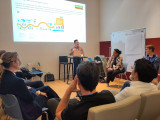
On the 5th of July, during Demoday #28, we zoomed in on one of the pressing challenges facing the energy transition: grid congestion, and more specifically, how to keep the people who maintain the grid moving efficiently.
Grid congestion is a serious and growing concern for grid operator Alliander. It is therefore essential to speed up the grid reinforcement as much as possible. Alliander’s Operation 2.0 team is exploring innovative ways to work smarter, faster, and more flexibly to keep pace with these developments.
Their efforts focus on three tracks:
• Alleviating staff shortages by training office employees to occasionally support fieldwork.
• Exploring technologies like advanced ground radar to get better insights into underground assets.
• Improving the logistics of supplying mechanics to ensure they have the right tools, in the right place, at the right time.
This last track was the main focus of our work session.
Inefficient supply of mechanics
Logistics experiences show that mechanics collect materials inefficiently when supplying their vans and jobs, resulting in stock corrections, less control over stock, unnecessary work for logistics staff, and valuable mechanic hours being lost, which leads to less execution work. A few key problems stood out:
• Supplies are scanned inconsistently, so the system doesn’t reflect what is actually in stock.
• Every van is different, with a custom layout that suits the preferences of its mechanic.
• The work itself is unpredictable, which makes standardised restocking difficult.
• With a transition to smaller electric vans, space is becoming even more limited.
A simple optimisation of the process is not enough, especially without considering the human element. For many mechanics, a visit to the supply centre is more than just logistics. It is a moment of connection, a short break from the road, or simply a chance for a good coffee.
Ideas from the network
In groups of four, we brainstormed creative ideas to improve the supply of Alliander vans while keeping the needs and routines of mechanics in mind.
Some highlights:
• Peer-to-peer van inspiration: Let mechanics share the layout of their vans with colleagues. They can exchange best practices and take pride in an efficient setup. Adding a bit of gamification might boost motivation even more.
• A mobile supply service: A supply van could drive around to restock mechanic vans, reducing the need to visit the supply centre. However, this might remove the social element of taking a break with colleagues.
• Smarter routing: Track the location of mechanics only in relation to nearby grid faults. This way, the closest available mechanic can respond without feeling like their movements are constantly being monitored.
• Package-based resupply: Inspired by delivery service Picnic, mechanics could exchange complete “supply packages” instead of picking out materials individually. Collaborating with wholesale suppliers could reveal more useful insights.
• Automatic stock tracking: Tag all materials with RFID chips and use sensors installed in the door of the van to register what is removed from the van. This eliminates the need for manual scanning and reduces the chance of mistakes.
Do you have a bright idea to improve how mechanics work? Let us know in the comments or send a message to Noor at noor@amsterdaminchange.com.
A big thank you to Thomas Hoekstra and Iris van der Zanden from Alliander for bringing this challenge to the network, and to Chantal Inia from Royal HaskoningDHV for moderating the session.
🚨 𝗪𝗲'𝗿𝗲 𝗮𝗹𝗿𝗲𝗮𝗱𝘆 𝗮𝘁 𝟱𝟬% – 𝗮𝗻𝗱 𝘄𝗲 𝗵𝗮𝘃𝗲𝗻'𝘁 𝗲𝘃𝗲𝗻 𝗸𝗶𝗰𝗸𝗲𝗱 𝗼𝗳𝗳 𝘆𝗲𝘁! 🚨
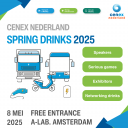
Wow! Half of the tickets for our Cenex Nederland Lenteborrel have already been ordered – and the event isn’t even happening until 8th of May 2025. 🎉
That means: lots of excitement, high expectations, and... an opportunity you don’t want to miss.
The event will be focusing on Transport & Mobility, Circular Mobility, Energy & Infrastructure, where you can expect the following.
📍 What to expect:
✅ Meet exhibitors and explore the latest innovations
🎮 Join or watch two exciting serious game sessions
🎤 Be inspired by four engaging keynotes (English)
🥂 End the day with our annual spring reception where you have the opportunity to network.
Want to join us? Don’t wait too long – the remaining 50% is likely to go even faster. 🎫
Please make sure to get your (free) ticket via Eventbrite
Demoday #27: Zero Emission City Logistics - The Food Center Amsterdam Case. Hosted by the Interdisciplinary Graduation Circle (HvA)
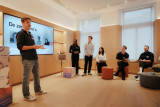
Amsterdam faces a major logistics challenge: from January 2025 onwards, polluting delivery vans will no longer be allowed in the city centre. How can entrepreneurs and suppliers in the food sector prepare for this and turn the transition into a success? Four fourth-year students from the Amsterdam University of Applied Sciences (HvA) are working together in an interdisciplinary graduation circle to find solutions. They are addressing both the technical aspects of this issue and the communication side. Drawing on their different fields of study, they analyse the problem and develop a joint recommendation for the Amsterdam Transport Region (Vervoerregio Amsterdam). As part of their research, they used this working session as a focus group with stakeholders from the Amsterdam InChange network.
Opening of the session
Stan van der Meer (Logistics Management), Chanel Pinas (Digital Marketing), Jay van den Boog (Digital Marketing), and Vanessa Man (Logistics Engineering) opened the session with a few questions to get a sense of the participants in the room. The attendees rated their own level of expertise on the topic and wrote down a word they associated with the issue.
The room was filled with expertise: policymakers from the Municipality of Amsterdam directly involved in the issue, as well as researchers and advisors from Arcadis and Cenex who are actively working on zero-emission logistics. Representatives from the Port of Amsterdam and EIT Urban Mobility (a European network) were also present, each bringing their own perspective on the challenge.
Statements and discussion
The students facilitated the discussion by presenting a number of statements, and moderating the group discussions that followed. Below are a few observations.
Statements 1 and 2 (summarized): Amsterdam entrepreneurs are aware of the new zero-emission policy, and it is clearly presented to them.
There was broad consensus within the group regarding the city’s policy. Communication from the Municipality of Amsterdam has been extensive over the past ten years — first targeting larger logistics partners in the city, and more recently also via letters to local entrepreneurs. In addition, physical signs throughout the city communicate the new regulations. However, what can cause confusion among entrepreneurs are the mixed signals coming from national politics and policies. This can create the impression that there is a lack of determination or vision behind the transition, making entrepreneurs hesitant to invest in new electric vehicles.
Statement 3: There is sufficient support for entrepreneurs to switch to zero-emission transport.
The group also agreed that the municipality is doing a good job offering financial support where needed. Advisors, for example, are available to guide entrepreneurs through the rules and support options. However, it was noted that the target audience still does not always have a clear overview of all the possibilities. While the municipality communicates well and “presents” the available opportunities, confusion and uncertainty remain among entrepreneurs on the streets. This represents an important communication challenge that the students will further explore.
Also, regarding this statement and the ones before, it was noted that the (micro)entrepreneurs and stakeholders we were talking about weren't present in the room. It would have been good to have more of the target group in the room, but for this session specifically the policymakers and specialists from our network were the ones the students focussed on. In the following months of their research, their focus will be on the specialists and (micro)entrepreneurs in the food sector.
Statement 4: Logistics hubs play an important role in reducing transport movements in the city.
This part of the discussion became more technical. The group agreed that a new logistics system with greater use of hubs throughout the city is, in theory, a logical and effective step in this transition. In practice, however, it is not as simple as it sounds. For example, consider the Port of Amsterdam — an existing large hub at the edge of the city for water-based transport. While goods can be transferred there to smaller vehicles for distribution within the city, docking on the busy canals poses a significant challenge. Additionally, water transport was the first sector required to become fully electric, and this system is currently somewhat reduced in scale
Road transport is also complex. Hubs are locations where goods from different suppliers can be combined and delivered with fewer transport movements. But who holds responsibility for these goods if something goes wrong? And how can this be managed without adding too much delivery time?
One of the participants summarized it well: we are shifting from logistics as a chain, where each party is responsible for a small part, to an ecosystem where all actors and the physical infrastructure depend on one another, share collective responsibility, and need to exchange information and services to keep the system running.
In-depth interviews
The second part of the session consisted of two breakout groups in which the students could ask targeted questions for the research they are conducting. Jay and Chanel spoke with several participants about the research side of the project, delving deeper into successful research methods that involve entrepreneurs. Stan and Vanessa spoke with another group of participants about potential solutions for this issue, gathering knowledge about existing innovations and solutions or what might still be needed for this logistical transition.
Follow-up
Through this focus group, the students in this interdisciplinary graduation circle have engaged in dialogue with experts on this topic from various organizations. They also made many new contacts and actively shared their project with the network. During our upcoming Knowledge and Demo Day on June 5, they will once again be part of the program and present their results and potential conclusions.
Would you like to know more about the graduation circle, the research topic, or do you have tips or questions for the students? Feel free to reach out via pelle@amsterdaminchange.com
Cenex Nederland Lenteborrel 2025 - 8 mei

🌿 Vier de lente met ons tijdens de Cenex Nederland Lenteborrel 2025! 🌸
[English below]
Op 8 mei 2025 organiseren we weer een nieuwe editie van de Cenex Lenteborrel! Dit jaar is de editie open voor iedereen, het wordt een inspirerende middag vol innovatie, samenwerking en netwerkmogelijkheden.
📍 Locatie: A-lab, Overhoeksplein 2, 1031 KS Amsterdam
🕒 Tijd: 13:30 - 18:30
✨ Wat kun je verwachten?
🔹 13:30 - 15:30 – Inloop & exposanten
Ontmoet onze exposanten en ontdek de nieuwste innovaties op het gebied van mobiliteit en circulariteit.
🔹 13:30 - 15:00 – Twee serious games
Doe mee aan een interactieve sessie en verken de uitdagingen en kansen in de sector op een speelse manier. Liever toeschouwer? Dat kan ook! (Kies één sessie)
🔹 15:30 - 16:45 – Vijf inspirerende keynotes (Engels)
We verwelkomen sprekers van onder andere:
⚡ Coding the Curbs
⚡ Kempower
⚡ Ministerie van Infrastructuur en Waterstaat
⚡ Circular Campus
⚡ Cenex Nederland
🔹 16:45 - 18:30 – Gezellige Lenteborrel
Sluit de dag af met een hapje en een drankje, terwijl je nieuwe connecties legt met andere professionals.
Houd onze Eventbrite-pagina en LinkedIn in de gaten voor updates over sprekers en exposanten!
📢 Bevestig je aanwezigheid en mis het niet! (Beperkt aantal tickets beschikbaar)
Registreer hier: https://cenex-lenteborrel-2025.eventbrite.nl
-------English
🌿 Join us for the Cenex Spring Reception 2025! 🌸
On May 8, 2025, we’re hosting the latest edition of the Cenex Lenteborrel (Spring Drinks)—and this year, it’s open to all! Expect an inspiring and engaging afternoon filled with innovation, collaboration, and networking.
📍 Location: A-lab, Overhoeksplein 2, 1031 KS Amsterdam
🕒 Time: 13:30 - 18:30
✨ What’s in store?
🔹 13:30 - 15:30 – Walk-in & exhibitor showcase
Meet our exhibitors and explore the latest advancements in mobility and circularity.
🔹 13:30 - 15:00 – Two serious games
Join an interactive session tackling industry challenges in a fun, engaging way. Prefer to observe? That’s possible too! (Choose one session.)
🔹 15:30 - 16:45 – Five inspiring keynotes (English)
Industry leaders will share their insights, including:
⚡ Coding the Curbs
⚡ Kempower
⚡ Ministry of Infrastructure and Water Management
⚡ Circular Campus Delft
⚡ Cenex Netherlands
🔹 16:45 - 18:30 – Spring Networking Reception
Wrap up the day with drinks, bites, and great conversations with fellow professionals.
Stay tuned via our Eventbrite page and LinkedIn for speaker and exhibitor updates!
📢 Confirm your attendance and don’t miss out! (Limited tickets available)
Register here: https://cenex-lenteborrel-2025.eventbrite.nl
Let’s talk about speed: Safer vehicles or safer streets?

On December 18, join us for an evening in Amsterdam where we talk about Speed and Safety in cities. Do safer vehicles make us forget the need for safer streets?
Townmaking Institute in collaboration with Gemeente Amsterdam
In conversation with
Carl Honoré: Writer, speaker, broadcaster, advocate of the Slow Movement
Luca Bertolini: Professor of Urban Planning UvA
Onno Kramer: Head Collection Management at Accel
Vehicle speeds, whether cars, trucks, or e-bikes, profoundly affect our experience of cities. What feels too fast or too slow often depends on the place we occupy in traffic: a pedestrian may feel endangered by a motorist’s speed, while the motorist simply wants to reach their destination.
Traditionally, fixed speed limits have been the solution, but these don’t account for the dynamic nature of urban spaces, nor the emergence of new vehicle types. Unsafe streets push people into safer vehicles, but in doing so, we risk neglecting making safer streets.
To create safer, more livable streets, we need to rethink our approach to speed regulation, considering the evolving complexity of urban life.
This event marks the start of our journey towards the Speed Summit in 2025. The conversation opens with Carl Honoré, Luca Bertolini, and Onno Kramer exploring what should come first for liveable cities: safe streets or safe vehicles.
Event Details:
Wednesday, 18th December 2024
At 20:00 hours.
Grote Zaal, Pakhuis de Zwijger,
Piet Heinkade 179,
1019 HC Amsterdam, The Netherlands.
Townmaking Podcasts.
Listen to the Townmaking episodes to dive deeper into the ideas that help shape the conversation.
https://www.townmaking.com/search/cls-townmaking-podcasts/cnt-s1e7-speed-liveability-and-safety
Basic Intellectual Property Rights training (Free of charge/Dutch spoken) .

This free of charge training will be given in Dutch!
Protect your ideas and strengthen your competitive advantage with the basic Intellectual Property Rights training.
What will you learn during the training?
- Introduction to different IP rights: get a clear understanding of the IP rights that protect you.
- Real-life examples of collaboration and ownership: Learn how IP rights work in collaborations.
- Freedom to operate: discover how to preserve room to innovate without legal risks.
- The value of technical details in patent publications: Understand how these details give you an advantage in the market.
When: Monday, 9 December 2024 15.30 - 18.00
Location: Ondernemersplein Almere (cityhal Almere), Stadhuisplein 1, 1315HR Almere
Demoday #25: Scenarios for Smart Mobility in the Province of North Holland 2050
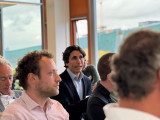
During our Knowledge and Demo Day on 10 October (2024), Guus Kruijssen and Rombout Huisman (Province of North Holland) led a working session on their recent scenario studies – Smart Mobility North Holland 2050. In this report, I will share the four ‘Context’ scenarios they developed, the process, and the discussions with the session participants.
Objectives of the Scenario Study
What do we actually mean by future visions and scenarios? What are the different types, and how can they be used? A discussion among the participants quickly highlighted the many different motivations, forms, and use cases. Rombout and Guus began by explaining their aim for this study.
The province of North Holland plays various roles in the field of mobility as a policymaker, road manager, and concession provider. Given the major challenges related to housing, CO2 emissions reduction, and road safety, their perspective on the future of mobility revolves around Reducing (travel), Improving (travel options), and Changing (travel behaviour). This perspective forms the basis for developing, operationalising, and maintaining their strategy – a cycle that spans approximately 50 years. However, digital developments and innovations are making the world change faster than ever, necessitating greater awareness of possible contextual changes. The key question is: how do the choices we make now relate to the different possible futures?
To explore this, a team of colleagues embarked on developing four challenging context scenarios. Working with internal and external experts, they moved from an environmental analysis and contextual factors to scenarios and strategic insights. The process and outcomes were kept administrative and had no political or policy-driven focus. The result is not a set of visions to choose from but rather a representation of various developments and challenges that may arise, to which you can assess your own projects and actions against.
The Four Scenarios
Four distinct context scenarios were developed. Here is a summary and a few key aspects of each:
- Steady Traffic (Doorgaand verkeer) A slow shift towards a green economy, benefiting only the Amsterdam Metropolitan Area (MRA). The population grows to 3.7 million. Cars remain dominant, transitioning gradually to electric, but roads and trains stay congested. Digitalisation and innovation progress slowly, with limited impact on efficiency and accessibility.
- Turbulent Weather (Rukwinden) Ongoing shocks and international instability, with the US leaving NATO and significant climate change. The population increases to 3.1 million. Fuel crises accelerate electrification, but investment focuses on priorities like the navy. Technological scepticism grows due to data breaches, impacting accessibility.
- Our Own Path (Eigen weg) The Netherlands withdraws from international cooperation and leaves the EU, focusing on healthcare, circularity, and local production. The economy contracts due to trade restrictions and brain drain, and the population decreases to 2.6 million. Fewer traffic jams, but cars remain significant alongside increased regional public transport. Distrust in innovations and sustainability rises, with informal sharing preferred over commercial options.
- Transition (Overstappen) Climate change accelerates transition and AI development. The population stabilises at 3.1 million. Non-sustainable sectors disappear, and reduced traffic results from digitalisation and virtualisation. Space is primarily used for energy infrastructure, and circular processes increase. The EU and the national government push for innovations like autonomous transport and shared mobility. Ownership is limited to the wealthiest, and digital infrastructure becomes a priority.
Outcomes and Follow-Up
Rombout and Guus guided the group through the process and results of these scenario studies. We discussed the developments and contextual factors used in the study, and considered if anything was missing. They openly shared their approach and how they plan to use these insights to assess their own policies and projects, and welcomed questions and suggestions from the group. There was also room for discussing the challenges. Because, while people can easily align on scenarios, opinions can still vary greatly on how we should act on them now.
Many of our partners are already working with future visions and scenarios. See, for instance, our report on a session with trendwatchers from the Municipality of Amsterdam. The purpose, process, and impact on policy, projects, and actions vary across organisations. However, there was agreement that sharing methods and scenarios is valued, particularly in a neutral setting like our innovation network. It fosters mutual understanding and offers valuable lessons from each other's research methods and practical applications. In the coming period, we will explore how we can contribute to this in our network on various transition themes.
Would you like to know more about this study from the Province of North Holland? Feel free to send me a message, and I will connect you. Interested in brainstorming about how we can approach this more frequently or systematically within the network? Let me know at pelle@amsterdaminchange.com.
metaCCAZE - Summer Mobility Talks

Onder het genot van een hapje en drankje organiseren we vanuit het EU Horizon project metaCCAZE op 30 juli de Summer Mobility Talks. Met iedereen die nog niet op vakantie is, gaan we in gesprek over thema’s als autonoom varen, mobility credits, Intelligent Speed Adaptation en multimodale logistiek. De Summer Mobility Talks is een informele bijeenkomst voor iedereen die het leuk vindt om ideeën uit te wisselen over mobiliteit in de stad, én eenmooie gelegenheid om te netwerken.
Vanaf 15:30 uur staan de drankjes koud.
16:00 uur: korte introductie van het EU Horizon project metaCCaze
16:10 – 17:30: uitwisseling over thema’s en netwerken
Locatie: 027 Garage Marineterrein Amsterdam (Kattenburgerstraat 5, Amsterdam)
Iedereen is welkom om binnen te lopen, maar i.v.m. de catering horen we graag of je komt. Aanmelden kan via het Google Form.
Lees hier meer over het Europese metaCCAZE project.
Vacature: LCA & Circulaire Economie Specialist (Transport en Energie)
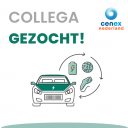
📢 Vacature Alert! 📢
Word jij onze nieuwe LCA & Circulaire Economie Specialist?
♻ 🌿 Stap in een rol waar jij direct bijdraagt aan betekenisvolle initiatieven die de toekomst van duurzame mobiliteit vormgeven!
Terwijl het gebruik van fossiele brandstoffen transformeert naar elektriciteit en waterstof, neemt ook de focus op de levenscyclusimpact en circulariteit van de waardeketens toe. Kom jij ons team versterken? Dan werk je aan baanbrekend onderzoek, analyses en strategieën rond duurzame (technologische en maatschappelijke) innovaties. Met behulp van jouw kennis, Life Cycle Assessments (LCA) en andere tools ben jij de specialist en innovator op weg naar een circulaire mobiliteitssector. Je werkt aan zowel lokale als internationale projecten, werkt samen met diverse andere specialisten en speelt een cruciale rol in deze reis.
🔍 Klaar voor deze uitdaging? Ontdek ⤵ hoe jij een verschil kunt maken!
💼 Locatie: Hybride (Amsterdam kantoor en thuiswerken)
⏰ Contract: Vast, fulltime (37 uur/week, 32 uur bespreekbaar)
💡 Sluitingsdatum: Geen specifieke datum, we zoeken de juiste match!
Klik op de link om het volledige vacaturedocument te lezen en te solliciteren. We kijken ernaar uit om van je te horen!
IoT Tech Expo Europe returns to Amsterdam
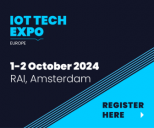
IoT Tech Expo Europe is returning to Amsterdam!
Join us in-person at the RAI Amsterdam on October 1-2, 2024, to hear from industry-leading speakers. Your ticket also provides access to co-located events on Intelligent Automation, Cyber Security & Cloud, AI & Big Data Expo, Unified Communications, Edge Computing, and Digital Transformation.
Speakers represent such companies as Airbus, Lego, Whirlpool, Orange and many more!
For more information and to book your tickets, visit:
https://www.iottechexpo.com/europe/
Fetured agenda items include:
• 5G and IoT Integration
• Deploying IoT management tools to achieve production targets
• Empowering EVs: How IoT and AI Can Work Together to Revolutionize EV Charging Efficiency
• How IoT will change the future of payments
• IoT Integration in Smart Factories and Industry 4.0
• From smart industry to a productive enterprise
• Role of Edge Computing in IoT Security
• Securing the Internet of Things: Leveraging Blockchain and AI for Advanced Cybersecurity
• IoT Applications in Telecommunications
• Digital Twins: Real-world Applications and Impact on IoT Data Visualization
Interesting case studies, such as:
• Singtel Case Study – Connectivity in telecoms at local, regional and global level
• Whirlpools South American Smart Factory: Driving Industry 4.0 Revolution through a new factory design and startup in Argentina
just to mention a few!
Register for free here: https://www.iottechexpo.com/europe/
#IoTTechExpo #IoT #InternetofThings
Visit us at Intertraffic Amsterdam at booth 10.336
Discover our solutions for disabled parking management (as installed in Breda), management for electrical charging on public loading infrastructure and shop&go parking spots.
Circular Challenge: How Can We Stimulate Circular Business Models in the Electric Vehicle Charging Infrastructure Chain?
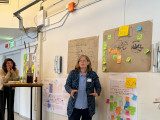
Circular initiatives often struggle to progress beyond the pilot phase, including circular charging infrastructure. Numerous barriers hinder these circular initiatives:
• Lack of data on products and how circular/sustainable they are.
• Difficulty in implementing circularity across the entire production chain.
• Regulatory obstacles.
• Current higher costs associated with circular production, leading to more expensive products.
To overcome these barriers, adjustments to regulations are necessary to better align with circular initiatives, alongside the establishment of shared ownership within the production chain.
Doe mee aan de Green Innovation Hub contest!

In Almere en de provincie Flevoland vinden de grootste gebiedsontwikkelingen van Nederland plaats zoals Hortus, Pampus, Zuidoever. Om echt toekomstgericht te kunnen bouwen en als voorbeeld te dienen voor de rest van Nederland, organiseren zij de Green Innovation Hub contest ’24. In deze competitie worden organisaties uitgedaagd om met digitaal gedreven toepassingen te komen op het gebied van duurzame energie, mobiliteit of slim wonen.
Ben jij een start-up, scale-up of een innovatief kleinbedrijf (MKB), en heb jij een digitaal gedreven toepassing op het gebied van duurzame energie, mobiliteit of slim wonen? Is jouw oplossing klaar om verder te groeien, te versnellen en op te schalen? Een oplossing waarmee jij echt impact kan maken? Doe dan mee met de Green Innovation Hub Contest ’24.
Op 6 maart wordt op basis van de ingezonden video-pitches een selectie gemaakt van de tien bedrijven die worden uitgenodigd voor het Green Innovation Hub Café. Op woensdag 17 april vindt de Contest Day plaats, tevens de officiële opening van de GIH 3.0 op de 9e verdieping. Tijdens dit evenement zullen de 10 deelnemers hun pitch presenteren, met een maximale duur van 4 minuten. Na de pitches krijgt de jury de gelegenheid om vragen te stellen. De winnaar wordt door experts verder geholpen en begeleid.
Check de website link voor meer informatie!
Join our team! Circular Economy and LCA Team lead
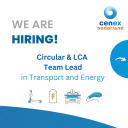
Are you an experienced professional in Circular Economy and Life Cycle Assessments and eager to lead a team of experts in zero-emission mobility and energy infrastructure? If so, we have the perfect opportunity for you!
WHO WE ARE
Cenex Nederland is a not-for-profit research organisation and consultancy specializing on zero emission mobility, energy infrastructure and circular economy. Our mission is to support our customers and partners in making the world a better place to live and travel.
We are a compact but rapidly growing team with complementary expertise. We foster a work environment that is supportive, encouraging self- initiative, and promoting independence. Join our fun and professional team where sustainability and innovation are considered 'business as usual'!
Following the motto 'Alone we can do so little; together we can do so much' we collaborate with governments and industry parties helping then achieve their zero emission transport goals.
Amsterdam may be our hometown, but our activities and ambitious agenda have an international reach. We frequently engage in European or international projects working together with other professionals.
YOUR ROLE
The world of e-mobility is evolving rapidly. Not only are battery and hydrogen electric vehicles becoming an integral part to the transport and energy landscape, but the focus on their lifecycle impact and circular economy within the industry’s value chain is also gaining significant traction. Should you join us, you will be leading a small team of Life Cycle Assessment (LCA) experts and will be contributing in various research and consultancy assignments. Your daily activities would include:
• Leading a growing team of circular economy and LCA experts, offering guidance and support
• Managing EU-fundedR&D projects in the field of transport and renewables
• Conducting research, modelling and analysis of environmental, social and economic lifecycle impacts of products within the transport and energy industries.
• Leading the development of eco-design tools, circular economy roadmaps and policy frameworks to support public or private organisations in achieving their circularity goals.
• Writing project proposals and engaging with prospect clients.
• Reviewing and writing scientific and public-facing reports
• Presenting at conferences, organising training sessions and workshops
YOUR PROFILE
The role of Circular Economy & LCA Team Lead within Cenex NL encompasses a variety of specialisms. We are seeking a new colleague who meets the following requirements:
Essential
• A minimum of five years in roles related to circular economy consultancy and/or research, or other relevant experience.
• Relevant Master’s degree (such as Industrial Ecology, Industrial Design, Engineering, Environmental Sciences).
• Demonstrated project management experience and ability to responsibly manage multiple projects.
• Experienced in using LCA software to quantify environmental, social and economic impact.
• Strong affinity/experience with mobility, transport, and energy sectors and related technologies
• Ability to deliver value and quality to our customers and partners (verbally and written)
• Self-starter and completer of assignments
• Willing and able to travel (inter)nationally with some regularity
• Already living in the Netherlands with an existing work-permit to work in NL Fluent in English, written and spoken
Desirable
• Experience in people management
• Experience with (EU) funding programmes (such as Horizon Europe)
• Dutch (at minimum A2 level) and/or additional languages
• Driving licence
CONTACT DETAILS
Do you see a good match? Send us your <strong>CV and motivation letter</strong> to hello@cenexgroup.nl We look forward to hearing from you!
Deelscooteraanbieder Check introduceert een veiligheidsslot
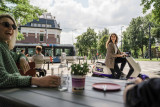
Deelscooteraanbieder Check introduceert vandaag een veiligheidsslot in haar app: de Safety Lock. De Safety Lock is ontworpen in afstemming met jongerenorganisatie TeamAlert. Met het slot kunnen gebruikers de eigen Check app tijdelijk blokkeren voor het reserveren van voertuigen. Op deze manier beschermt de gebruiker zichzelf tegen het (laagdrempelig) gebruik maken van scooters op een later tijdstip. Naast de Safety Lock introduceert Check ook een gerichte communicatiecampagne om gebruikers op relevante momenten te wijzen op de gevolgen van rijden onder invloed.
TeamAlert: ‘Actie nodig om dronken jongeren van deelscooter te houden’
In februari 2023 publiceerde TeamAlert, een organisatie die zich inzet voor de verkeersveiligheid van jongeren, een enquête waaruit blijkt dat ruim een kwart van de jonge deelscootergebruikers met een leeftijd tot en met 24 jaar wel eens onder invloed op een deelscooter stapt en de risico’s daarvan onderschat. De enquête was onder bijna duizend jongeren afgenomen. Naar aanleiding van het onderzoek riep TeamAlert gemeenten en deelscooteraanbieders op om in actie te komen en na te denken over oplossingen.
Deelscooteraanbieder Check introduceert de Safety Lock
Het onderzoek van TeamAlert, in combinatie met een landelijke toename van het gebruik van alcohol en drugs in het verkeer in 2022 (37,4% meer uitgedeelde boetes), is aanleiding geweest voor deelscooteraanbieder Check om in actie te komen. Op basis van meerdere gesprekken en feedbacksessies met deelscootergebruikers en verschillende autoriteiten op het gebied van verkeersveiligheid, waaronder TeamAlert, introduceert Check vandaag de Safety Lock. Met het slot kan elke gebruiker de eigen Check app tijdelijk blokkeren voor het reserveren van voertuigen. Op deze manier beschermt de gebruiker zichzelf tegen het (laagdrempelig) gebruik maken van scooters op een later tijdstip. Mochten gebruikers het slot toch willen deactiveren, omdat ze bijvoorbeeld niet onder invloed zijn, dan moeten ze eerst verplicht één minuut lang een tutorial over de gevolgen van rijden onder invloed bekijken. Gebruikers die het slot activeren worden gestimuleerd om hun Safety Lock te delen met vrienden om uit te dragen dat onder invloed zijn en rijden, niet samen gaat.
De Safety Lock helpt de gebruiker bij het maken van de juiste keuze
Saar Hadders, gedragsonderzoeker bij TeamAlert, legt uit hoe de Safety Lock gebruikers in staat stelt om de juiste keuzes te maken: “Onder sommige gebruikers geldt een sociale norm dat het rijden onder invloed op een deelscooter normaal is. Door het bedenken van een nieuwe feature om rijden onder invloed op deelscooters tegen te gaan, zendt Check een krachtige boodschap uit dat dit gedrag niet oké is. In de omgeving van jongeren zijn vrienden erg belangrijk in het creëren van een veilige sociale norm. Doordat de Safety Lock gebruikers stimuleert om de feature met hun vrienden te delen, wordt deze sociale norm versterkt.”
Hadders: “Jongeren hebben niet altijd de intentie om na een avondje stappen onder invloed te gaan rijden, maar door een combinatie van impulsiviteit en het effect van alcohol kan deze intentie vervagen. De Safety Lock biedt jongeren de mogelijkheid om zichzelf vóórdat ze hun eerste drankje drinken, te behoeden voor een onveilige rit naar huis. Wanneer gebruikers in de loop van de avond tóch van gedachten veranderen, deelt Check kennis over waarom het goed is om nuchter te rijden. Deze kennis kan helpen om alsnog het veilige gedrag te vertonen en ander vervoer te kiezen.”
De Safety Lock wordt versterkt door gerichte en relevante communicatie
Check heeft de communicatie om rijden onder invloed tegen te gaan opgedeeld in drie tijdvakken. De tijdvakken zijn gebaseerd op onderzoek van het SWOV. Afhankelijk van het tijdvak worden gebruikers aangemoedigd tot verantwoordelijk gedrag in het verkeer, bijvoorbeeld door gebruikers voorafgaand aan een avondje uit te attenderen op de mogelijkheid om het Safety Lock te activeren. Gebruikers die vrijdag- of zaterdagnacht tussen 23.00 uur en 06.00 uur een deelscooter willen pakken moeten eerst verplicht een tutorial kijken over de gevolgen van rijden onder invloed.
The impact of the availability of 'self-driving' cars on travel behavior 2/8
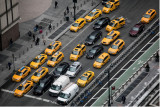
If autonomous cars can transport us affordably, do we no longer want to own our own car? Are we switching en masse from public transport, do we leave our bikes unused, or do we walk less? Do we drive alone, or do we share the car with other passengers? Will autonomous cars share he road with other traffic, including cycling? Are we going to use a car more often and longer and how many cars drive empty waiting for a customer?
Of course, no scientific study can answer all these questions yet. Nevertheless, research offers some insight.
Ride-hailing
First, what do we know about the influence of ride-hailing? That is calling a taxi from Uber or Lyft and a handful of other companies with an app. Juniper Research expects that the use of this service, which already has a global turnover of $ 147 billion, will increase fivefold in the coming five years, regardless of whether the taxis involved are 'self -driving' or not. Clear is that most users seem not to appreciate the presence of fellow passengers: the number of travelers that share journeys is only 13%.
Research in seven major American cities shows that 49 to 61 percent of all Uber and Lyft-taxi rides would have been made by walking, cycling, taking public transport or not at all. These journeys only replace car use to a limited extent. As a result, the number of train passengers has already fallen by 1.3% per year and that by bus by 1.7%. At the same time, congestion has increased.
A publication in the Journal Transport policy showed that travelers travel twice as many kilometers in every American region that they would have done if Uber and Lyft did not exist. It also turned out that taxis drive empty 50% of the time while they are waiting for or on their way to a new customer. Another study found that many Uber and Lyft customers who once used public transport buy a car for themselves.
The effect of 'self -driving' cars
The number of studies after the (possible) effect of the arrival of 'self -driving' cars is increasing rapidly. Research by the Boston Consultancy Group showed that 30% of all journeys will take place in a 'self -driving' car as soon as they are available. A considerable number of former public transport users says they will change. Despite the price advantage, the respondents will make little use of the option to share a car with other passengers, but it is known that attitudes and related behavior often differ. Nevertheless, this data has been used to calculate that there will be more cars on the road in large parts of the cities, resulting in more traffic jams.
Semi-experimental research also showed that the ability to travel with a 'self-driving' car results in an increase in the number of kilometers covered by around 60%. Unless autonomous cars drive electrically, this will also have significant negative consequences for the environment.
The Robottaxis in suburbs had a different effect: here travelers would leave their car at home more often and use the taxi to be transported to a station.
See robot taxis and public transport in combination
Despite all the reservations that must be made with this type of research, all results indicate a significant increase in the use of taxis, which will be at the expense of public transport and will result in more traffic jams in urbanized areas. This growth can be reversed by making shared transport more attractive. Especially on the routes to and from train, metro, and bus stations. Only in that case, will there be an ideal transport model for the future: large-scale and fast public transport on the main roads and small-scale public transport for the last kilometers and in rural areas.
In a couple of days my new ebook will be available. It is a collection of the 25 recommendations for better streets, neighbourhoods and city's that have been published at this spot during the last months
Swedish Chamber Tech for Good by Ericsson at the 5G Hub Eindhoven

The Swedish Chamber of Commerce and Ericsson is very pleased to invite you and your business relations to the exciting Swedish Chamber of Commerce Tech for Good – 5G Impact on Sustainability, which will be hosted by Ericsson on November 7, 2023, at the 5G Hub at High Tech Campus Eindhoven.
The digital transformation is an important enabler for companies to become more sustainable: when business processes become more efficient, companies will be able to save energy and/or reduce CO2 emissions. 5G plays a key role in the digital transformation. This is demonstrated at the 5G-Hub in Eindhoven, a joint initiative of Ericsson, Vodafone-Ziggo, Brainport Eindhoven, and High Tech Campus. The 5G hub was established to promote innovation and stimulate solutions that help improve sustainability.
This event is offered free of charge, registration is however, compulsory.
Sign up at the Swedish Chamber of Commerce website:
November 7, 2023 Tech for Good by Ericsson at the 5G Hub – Swedish Chamber of Commerce
For more information visit our website or send an email to events@swedishchamber.nl
AMS Conference 2024: Call for abstracts and special sessions

We invite you to contribute to the conference "Reinventing the City 2024 - Blueprints for messy cities?"
Deadline to submissions: November 14, 2023
Notification of acceptance: December 14, 2023
submit here>>
The AMS Scientific Conference (AMS Conference) explores and discusses how cities can transform themselves to become more livable, resilient and sustainable while offering economic stability. In the second edition of “Reinventing the City” (23-25 April 2024), the overarching theme will be <em>"</em>Blueprints for messy cities? Navigating the interplay of order and complexity'. In three captivating days, we will explore 'The good, the bad, and the ugly' (day 1), 'Amazing discoveries' (day 2) and 'We are the city' (day 3).
Call for abstracts
The AMS Conference seeks to engage scientists, policymakers, students, industry partners, and everyone working with and on cities from different backgrounds and areas of expertise. We therefore invite you to submit your scientific paper abstract, idea for a workshop or special session with us. Submissions should be dedicated to exploring the theme ‘Blueprints for messy cities?’. We especially invite young, urban rebels to raise their voice, as they are the inhabitants of our future cities.
Assessment
Our scientific committee responsible for the content of the conference program will assess all submissions and select a final program of contributions. Notification of acceptance will follow before 1 December 2023.
Topics
mobility | circularity | energy transition | climate adaptation | urban food systems | digitization | diversity | inclusion | living labs | transdisciplinary research
SUBMISSIONS AND CONTRIBUTIONS
| SCIENTIFIC PAPER ABSTRACTS |
We invite academics, industry partners, and professionals from all ages engaged in the related fields of urban design, governance, architecture, data science, engineering and/or sociology to submit an abstract for a conference presentation of your scientific paper (250-450 words).
| WORKSHOPS |
If you have a workshop proposal, please outline its purpose, the specific knowledge, techniques, or practices it covers, its objectives and learning outcomes, teaching strategies and resources, target audience, and any prerequisites, including the required level of experience (250-450 words).
| SPECIAL SESSIONS |
Next to scientific papers and workshops, we encourage you to submit different types of special sessions. These special sessions can include interactive forums, excursions, or practical demonstrations, depending on the subject and objectives. When submitting your proposal for a special session, we ask you to clearly highlight the session's objectives, expected collaborators (if applicable), the intended audience, and the type of session. Please also indicate whether you prefer an online or in-person format. Please note that you will be responsible for the content and organization of the session (250-450 words).
Click here to visit the event page and find more information on details about the Scientific Conference.
Stay up to date
Get notified about new updates, opportunities or events that match your interests.

